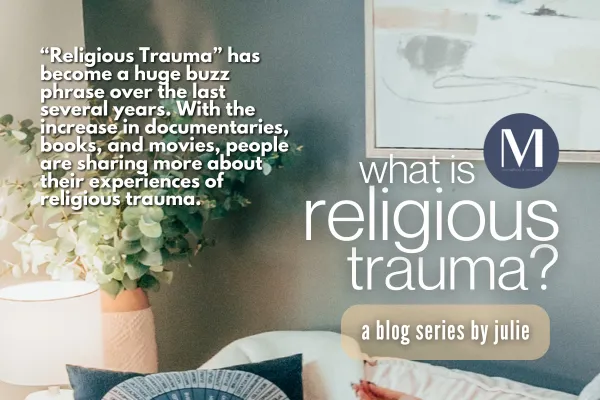the blog
A place for our team to share about topics they are passionate about, in hopes of allowing you to see and understand a bit more behind the faces on these pages.

What is Religious Trauma?
Religious trauma has become a huge buzz phrase over the last several years. With the increase in documentaries, books, and movies - people are sharing more about their experiences of religious trauma. Let’s dive into what religious trauma is so we can have a basic understanding as we go through this blog series.
Religious trauma can happen when someone feels harmed by something that happens within a religious environment or institution. It can be a single big event, or lots of smaller events that build up over time. It can be physical, sexual, psychological, emotional, financial, and/or relationally harmful. This can happen to anyone regardless of what faith, belief system or religion they may follow.
It is important to understand that not all religious experiences, environments, or relationships are harmful. Many people find comfort, community, and strength in their faith. It can be a phenomenal resource for many people. Sometimes though, things can go wrong and people can be hurt.
Here are a few examples of what religious trauma might look like:
Feeling guilt and shame, like you’re never good enough, that you have to be perfect and never measure up.
Fear of being punished and humiliated for making mistakes or having normal, natural human needs.
Doubting yourself and feeling like you can’t trust your own judgement. As if you have to approve what you think and feel with either a higher power or someone in authority.
Being shunned if you question or disagree with the teachings of one of the leaders within your community.
Losing trust. If someone within your community shares things that you’ve shared in confidence in an effort to “get the community to pray for you,” or betrays you, it can make it very difficult to trust people and build meaningful relationships again.
Emotional manipulation that leads to a sexual relationship with a spiritual leader within the community that meets their needs, but it must be kept a secret due to shame and humiliation that often comes with sex within some of those communities.
These are just a few ways that religious trauma can show up for people. There are many other ways as well so if you did not see your experience listed above, it does not mean that what you’ve experienced is not religious trauma. You are the one that gets to determine that. No one else does!
Let’s finish today with what are some things that you can do if you’ve experienced or are experiencing religious trauma.
Start to talk about it. Find someone that you trust, or someone outside of your religious community so you can begin to unpack what you’ve been experiencing.
Explore boundaries. Start to read about boundaries, what are they, how to set them, and how to stick to them. Start small, small boundaries are much more sustainable than big ones, especially in the beginning.
Seek support. Look for communities or places where you feel heard, accepted, and understood. Somewhere where you can talk about things and not feel guilt or shame for sharing and questioning.
Seek help. If you’re struggling or trying to figure out what the heck has happened, seek out a therapist who can help you navigate and understand your experiences.
Remember it’s ok to question things and develop your own belief systems, whatever that looks like. You may feel hurt by your religious community and love it at the same time and choose to stay because it is something that you deeply love, that is ok. You don’t necessarily have to leave, but you get to make the decision for yourself and not someone else make it for you. Remember that you deserve to feel safe, loved, valued and accepted for who you are.
If you’re not sure where to start, feel free to reach out to us and we can either plug you in to a therapist on our team or we can try to help you find one that might be a good fit for you.
Office Location: 1200 Brock Street South, Whitby, ON. L1N 4L9
© Marquis Counselling & Consulting | ALL RIGHTS RESERVED | TERMS & CONDITIONS | PRIVACY POLICY

